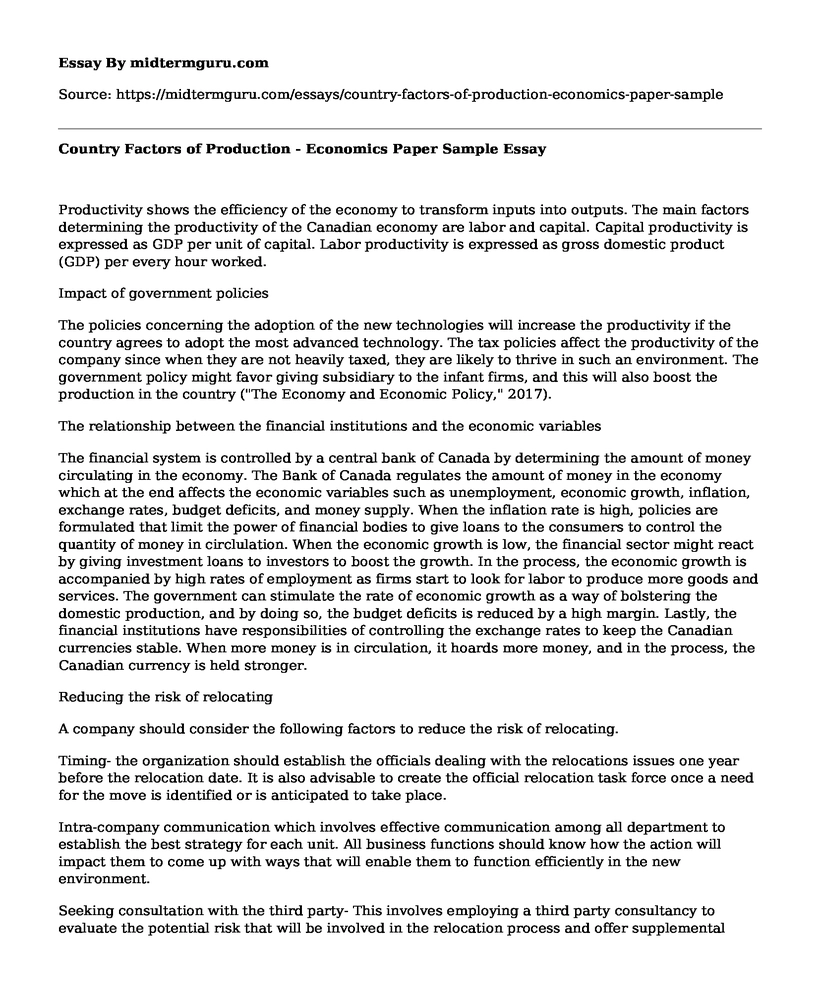Productivity shows the efficiency of the economy to transform inputs into outputs. The main factors determining the productivity of the Canadian economy are labor and capital. Capital productivity is expressed as GDP per unit of capital. Labor productivity is expressed as gross domestic product (GDP) per every hour worked.
Impact of government policies
The policies concerning the adoption of the new technologies will increase the productivity if the country agrees to adopt the most advanced technology. The tax policies affect the productivity of the company since when they are not heavily taxed, they are likely to thrive in such an environment. The government policy might favor giving subsidiary to the infant firms, and this will also boost the production in the country ("The Economy and Economic Policy," 2017).
The relationship between the financial institutions and the economic variables
The financial system is controlled by a central bank of Canada by determining the amount of money circulating in the economy. The Bank of Canada regulates the amount of money in the economy which at the end affects the economic variables such as unemployment, economic growth, inflation, exchange rates, budget deficits, and money supply. When the inflation rate is high, policies are formulated that limit the power of financial bodies to give loans to the consumers to control the quantity of money in circlulation. When the economic growth is low, the financial sector might react by giving investment loans to investors to boost the growth. In the process, the economic growth is accompanied by high rates of employment as firms start to look for labor to produce more goods and services. The government can stimulate the rate of economic growth as a way of bolstering the domestic production, and by doing so, the budget deficits is reduced by a high margin. Lastly, the financial institutions have responsibilities of controlling the exchange rates to keep the Canadian currencies stable. When more money is in circulation, it hoards more money, and in the process, the Canadian currency is held stronger.
Reducing the risk of relocating
A company should consider the following factors to reduce the risk of relocating.
Timing- the organization should establish the officials dealing with the relocations issues one year before the relocation date. It is also advisable to create the official relocation task force once a need for the move is identified or is anticipated to take place.
Intra-company communication which involves effective communication among all department to establish the best strategy for each unit. All business functions should know how the action will impact them to come up with ways that will enable them to function efficiently in the new environment.
Seeking consultation with the third party- This involves employing a third party consultancy to evaluate the potential risk that will be involved in the relocation process and offer supplemental advice to the relocation task force (Haacke, 2015).
Unemployment in Canada for the next five years
Since the 2008-2010 recessions, the Canadian economy has increased significantly leading to increased employment rate. Although it is projected that employment rate will increase in the next five years it will reduce the unemployment rate. But unemployment is expected range between 2.5-3% as the economy continues to recovery (Kogan, 2017). The low unemployment rates will as results of high employment rate in the health sector, technological sector, and the greenhouse project.
References
Haacke, O. (2015). Relocating Operations: Effective Communication Strategies. Retrieved from https://www.chinabusinessreview.com/relocating-operations-effective-communication-strategies/
Kogan, S. (2017). Unemployment Update - The 2016 Canadian Economy and Job Growth Forecast! - Recruiting In Motion. Recruiting In Motion. Retrieved 1 February 2017, from http://www.recruitinginmotion.com/2015/11/unemployment-2016/
The Economy and Economic Policy. (2017). Bankofcanada.ca. Retrieved 1 February 2017, from http://www.bankofcanada.ca/publications/books-and-monographs/why-monetary-policy-matters/1-economy/
Cite this page
Country Factors of Production - Economics Paper Sample. (2021, Jun 01). Retrieved from https://midtermguru.com/essays/country-factors-of-production-economics-paper-sample
If you are the original author of this essay and no longer wish to have it published on the midtermguru.com website, please click below to request its removal:
- Essay on How to Improve the Productivity of the Employees
- Essay on Tensions Between Creativity and Power
- Safety Issue and the Challenges of the Turkish Tourism Industry as a Result of Terror - Paper Sample
- Strategies for Global Firms' Organizational Structure: Paper Example
- Essay Sample on Nursing Leadership and Provision
- Research Paper on Strategic Urbanization of Information Technology and Planning
- Organizational Training: Enhancing Employee Development & Performance - Essay Sample







